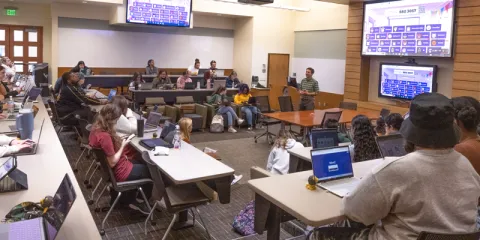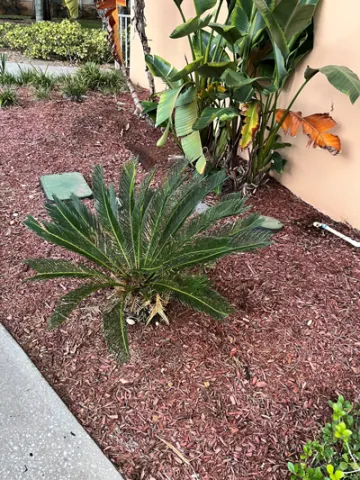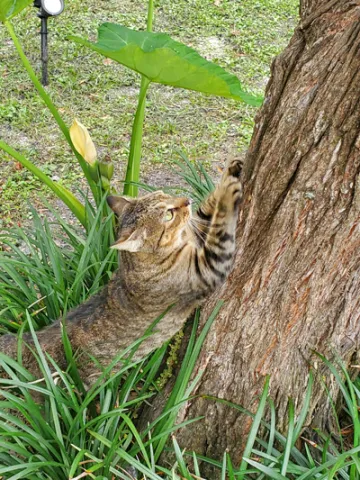Wild Florida Class Explores What Makes Sunshine State Stand Out
Learn about a unique undergraduate class called Wild Florida offered by Saint Leo University last fall as part of its Honors Program.

Learn about a unique undergraduate class called Wild Florida offered by Saint Leo University last fall as part of its Honors Program.

From intimidating alligators, to powerful hurricanes, to unscrupulous residents who make the news, Florida has certainly become one of the more distinct places among the 50 U.S. states.
This past fall, the Saint Leo University Honors Program offered a class called HON 160: Wild Florida at University Campus. It was first offered in the fall of 2021. Featuring two sections of roughly 130 total students combined, most of whom were freshmen, the course explored the numerous unique social and environmental aspects of the Sunshine State. It was team-taught by three Saint Leo instructors – Dr. Timothy Jussaume, an associate professor of philosophy and director of the Honors Program; Dr. Allyson Marino, an associate professor of English; and Prof Gianna Russo, an assistant professor of English and creative writing.
According to Russo, the class covered some incredibly hot topics.
“Florida is ground zero for unbridled development and climate change, both of which are changing the state's environment,” Russo explains. “Students need to understand what is happening here in order to be prepared to meet the future and to make wise decisions that will help preserve the natural world.”
Marino points out the unusual factors of the state and what considerations should be made about the impacts of these circumstances.
“Living here means dealing with hurricanes and extreme weather, red tide warnings at the beaches, and vast housing development that pushes wildlife to the outskirts and interiors of the state,” Marino says. “For students from Florida, the class offered them an important opportunity to think about their home and whether or not they hold any moral or ethical responsibility to that home. For international students and those from other states, Florida's unique landscape can inspire them to think about their own understanding of home as well.”
According to Jussaume, there were several key concepts of this class which apply to all Honors Program courses at Saint Leo University. These include critical thinking, productive dialogue on controversial questions, synthesis of multiple points of view, the use of credible sources, and logical arguments. Global citizenship was also a major theme of this particular course.
As a philosophy professor, Jussaume shares what he primarily concentrated on in terms of teaching this class.
“I focused on introducing students to how philosophers talk about ethics,” Jussaume says. “We explored our moral responsibility to care for the environment and to care for our neighbors, while also learning about specific moral challenges facing Floridians. The class also learned how to structure arguments, analyze difficult readings, and engage in civil discourse on challenging topics.”
Russo’s focus was on exploring wild Florida through literature, specifically short, nonfiction essays and poems. She also arranged for a field trip to the Disney Wilderness Preserve, an 11,500-acre nature preserve near Kissimmee, FL. While there, the students met with Dr. Leslie Poole, an associate professor of environmental studies at Rollins College.
“Dr. Poole led us through the preserve, offering relevant facts and pointing out indigenous flora that is pivotal to that ecosystem,” Russo says.
Other guest speakers she brought in to share their experiences included Randy Goggin, a park ranger and writer and Sean Sexton, a cattle rancher, artist, and poet.
“Both speakers offered a wealth of information about how their lives are woven into nature.”
For Marino, her instruction centered around literary and narrative representations of the state and its ecology.
“We asked important questions about the function of language in shaping our lives and representing them. We also looked at the ways different writers have described Florida and examined author perspectives, word choice, subject focus, and artistic representations.”
In addition to reading nature writing, students also got to pen their observations of nature around University Campus.

Team teaching is less common in higher education compared to the K-12 learning environment. However, Jussaume believes having three professors contribute to this course greatly benefited the students.
“There are very few courses in which you can study philosophical, ecological, and literary approaches to a topic in a single course,” Jussaume asserts. “Students can see faculty working together on the shared goal of producing an exceptional course. They also benefit from multiple approaches to key questions.”
Russo concurs and believes students will be more versatile graduates down the road.
“Getting exposed to different teaching styles makes the students more agile scholars,” she says.
From Marino’s standpoint, she thinks this approach is perfect for teaching this specific category of students who are just embarking on their college careers.
“For a first-year seminar class in which community building and support are so important, a team of teachers offers students that extra support and advocacy during their first semester,” she says.
Marino has also learned that this format helps each instructor improve by observing their colleagues in action.
Jussaume explains what he thinks students learned most from the class.
“The biggest takeaway is that there is no single approach to understanding a place as complex as Florida,” he says. “We learn best when we address questions from multiple perspectives and with openness to different points of view. It is my hope that students will now see more clearly how they can contribute to making our Florida community a better place.”
Marino is confident the class walked away with a broader outlook.
“I hope students came away with a deeper understanding of their own values and ideals,” she says. “I hope they would be curious about the world and excited to continue learning.”
Ethan Mazy, 19, took the Wild Florida course. Originally from Los Angeles, he spent most of his childhood growing up in Port Charlotte, FL. A 2022 alumnus of Charlotte High School, he is working on a BA in criminal justice specializing in criminalistics. He also recently rushed for the Sigma Alpha Epsilon fraternity.
Mazy enjoyed how different this class was from any others he has taken throughout his schooling.
“I have learned about the conquistadors, Seminole Indians, and manatees,” Mazy says. “But I’ve never really explored anything like the topics in this class.”
Mazy explains how his view of the “Florida man” archetype has evolved since taking this course.
“Prior to taking this class, I would have said a ‘Florida man’ is an unusual person. I think of the headlines of a guy wrestling a gator from a McDonald’s. In class, we discussed how the term has become an ongoing joke to put a label on and find comedy in Florida in general. It is usually associated with drug use or a mental health breakdown. We talked about whether it is okay to laugh at this idea. Personally, I think it’s okay to laugh, as long as the potential gravity of the situation is not ignored.”
In terms of the team-teaching approach to the class, he thought it was effective.
“I felt like they had their own strong suits and spearheaded their own areas very well,” he says of the three professors.
Mazy liked learning about the concept of moral responsibility and how it applies to nature.
“We talked about whether humans have a moral responsibility to protect nature,” he says. “It was very interesting to me to explore different perspectives on this concept from philosophical, ecological, and even religious angles.”

For the tiny ecology project, the students had to observe a specific area of nature each week for five weeks. he examined the landscaping outside of his residence hall on campus and says he did not notice too much change over this period.
“There is lots of foot traffic in this particular area,” he says. “I tied this into the perspective of humans kind of pursuing their own landscapes instead of appreciating the natural landscape.”
He and a classmate, Jennifer Tarr, collaborated on the research symposium project for the class. They focused on alligators, specifically how these reptiles are perceived by others and their current place in the natural environment.
“We studied where gators live, how their habitats are being impacted, and how they tie into the concept of wild Florida. We learned that the perspective on the alligator is very congruent with how people view Florida. People are talking about the ‘Florida man’ who finds a gator under his car or in his pool. But they don’t think about how the gator population in the Everglades was almost wiped out back in the 1980s.”
And what are the biggest things he learned from the class?
“This class improved my ability to think of different perspectives on topics you normally wouldn’t think about. I had never really thought about nature and moral responsibility. Overall, it was a very eye-opening class that allowed me to see Florida, as a whole, in a different way than how I’ve thought about it since I’ve lived here most of my life.”
Rylan Hutchins, 18, is a native of Dade City, FL who was also in the class. A 2022 Pasco High School alumnus, he is a freshman pursuing an undergraduate cybersecurity degree. Hutchins is considering the 3+1 program to earn two degrees in four years. On campus, he is a member of the PenTest Club and competes on the VALORANT Esports team.
Hutchins explains a big concept that stood out to him in the Wild Florida course.
“We talked a lot about being self-aware,” Hutchins says. “It’s so important to realize that we’re not the only ones inhabiting this planet, and I do have an impact on the environment that I need to be aware of.”
Another class discussion he found compelling was on the extrinsic versus intrinsic value of nature.
“We explored how nature has an intrinsic value, but how it might seem useless to some people if they don’t actually experience it. Not only can nature give you happiness, but there are also moral principles we need to uphold to help nature persist. We won’t realize this until nature is all gone as we know it.”
He also learned a lot about the topic of the Florida wildlife corridor.
“There have been many cases of how panthers are trying to migrate north, but they can’t in many cases because they have to pass through highways or neighborhoods.”
Like Mazy, he offers up his opinion on the “Florida man” idea.
“When you think of this term, you probably think of some guy standing out in the middle of a hurricane waving around an American flag with no shirt on,” he says. “It’s so interesting how this concept has been ingrained in those outside of the state and how they view Florida. Dr. Jussaume talked about when he visited another country and told someone he was from Florida, they immediately brought up the ‘Florida man’ concept. This example makes me think it has more of a negative perception from outsiders. You have to visit the state to understand that not everyone fits into this category.”
Several of the reading assignments were quite memorable to him. One that comes to mind for him was “This Is Water,” an essay by David foster Wallace. In it, the author writes about how people go through their days in a default state where they only worry about themselves without being empathetic toward the environment around them.
“If we get too caught up in this state, we will never be able to make a change,” Hutchins says.
Plus, “Understanding the Land Ethic” by Aldo Leopold made an impression on him. It talks about how the natural environment is part of a community.
“When we think of a community, we think of humans and the houses or buildings in which they live,” Hutchins says. “But we need to consider the natural environment and the importance of treating it well.”

As for his tiny ecology project, he observed a bottlebrush tree outside of his house.
“It has been here since I was born. I never thought about it much until doing this project. I did some research on how this tree helps the ecosystem by attracting butterflies and hummingbirds. Even with Hurricane Ian and Tropical Storm Nicole coming through last fall, it withstood these storms. To me, this kind of demonstrated an analogy of staying strong and persisting past challenges.”
He enjoyed how unique this project was.
“It was a cool way to do an assignment and also relax in nature while doing it,” he says. “It was a good getaway and a spiritual place away from human interactions and the stressors of life.”
For his research symposium project, he studied the Florida scrub jay, a bluish-gray bird that is endemic to the Sunshine State.
“I researched how these birds are being affected by humans because their population is dropping rapidly. Currently, there are only about 8,000 of them in the state. Because of overdevelopment, these birds are losing out on areas where they can live.”
He offers up a broad view on what he took away from the Wild Florida course.
“The class has led to all of us appreciating the world around us and helping younger generations respect it more,” he says.
Photo credit: The photographs of the tiny ecology projects included in this blog article were provided by Ethan Mazy and Rylan Hutchins and are used with permission.